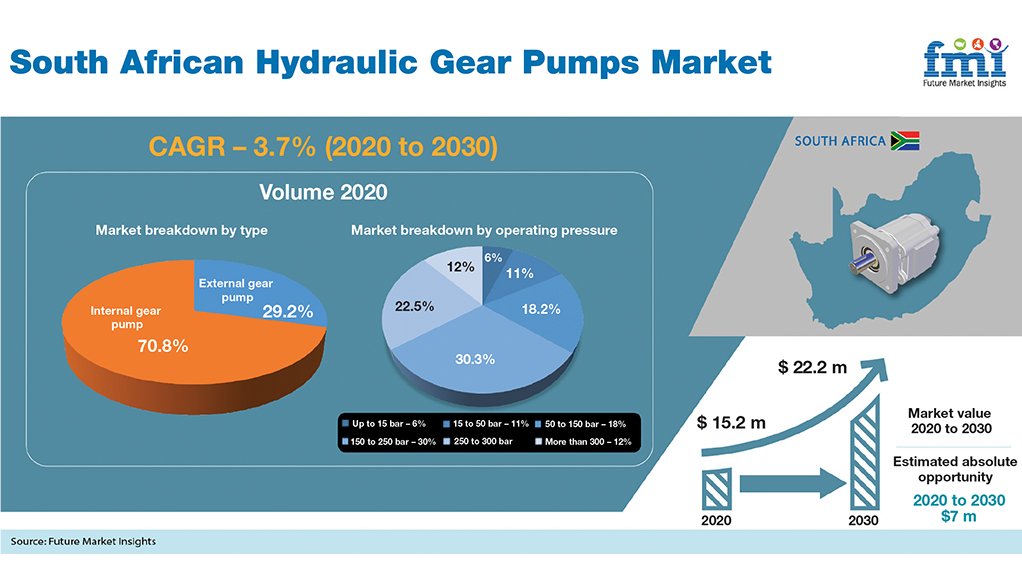The South African hydraulic gear pumps market is expected to be worth $22.2-million by 2030, growing at a compound annual growth rate of 3.9% over the next eight years, says market research and consulting company Future Market Insights (FMI), which published a report on the global hydraulic gear pumps market in March.
In 2020, hydraulic gear pump sales in South Africa surpassed $15.2-million, despite the impact of Covid-19 on sales and manufacturing. During this period, hydraulic gear pumps with an operating pressure of between 150 and 250 bar accounted for more than 30% of the local gear pumps market.
The key users of hydraulic gear pumps in South Africa are those operating in the minerals processing and automotive industries, owing to their sizeable production output.
“However, sales of these high-pressure pumps will be primarily driven by the expected growth in demand for materials handling and construction equipment in South Africa over the next decade,” explains FMI research associate VP Nikhil Kaitwade.
This demand is being driven by increased building and construction activities in the rural areas, and government’s increased spend on wastewater treatment facilities, owing to the country’s increasing population.
“Government is stepping up efforts to improve access to fresh drinking water in rural and urban areas. Consequently, British technology company Modern Water announced a partnership with South African water and wastewater treatment engineering, procurement and construction contractor WEC Projects, based in Johannesburg, to promote its proprietary All-Membrane Brine Concentration technology throughout Africa,” Kaitwade elaborates.
A rise in similar government investments and activities will dramatically boost hydraulic pump demand in South Africa in the coming years, he says.
Rising automotive sales and improved mining activities in the country are further driving demand.
In 2020, as per the International Organisation of Motor Vehicle Manufacturers’ automotive production statistics, South Africa ranked twenty-third in terms of passenger car and commercial vehicle production globally.
“Further, stringent government regulations aimed at lowering carbon dioxide emissions and promoting public awareness about energy conservation are predicted to propel lucrative growth in the South Africa hydraulic gear pumps market throughout the forecast period,” says Kaitwade.
Locally, hydraulic gear pumps have long been employed across a plethora of end-use applications, owing to their simple design, adaptability and ease of use, making them an ideal choice for numerous chemical and industrial use cases, notes Kaitwade.
“Compared with other pump types available on the market, hydraulic gear pumps prices stay in an inexpensive range. As a result, the uptake of hydraulic gear pumps is expected to rise throughout the forecast period.”
Market Restraints
The biggest limitation in the South African market is the high cost of pump maintenance after installation.
“The replacement of minor pump parts and procedures to maintain efficiency are expensive,” notes Kaitwade, adding that hydraulic pumps’ sophisticated functioning also impeded market expansion.
Apart from oil leaking in hydraulic cylinders, there are various other issues that must be kept in check. The cylinder rod's quality and polish must be checked regularly, while a load shift might occur if the rod is bent, he highlights.
Hydraulic equipment manufacturing also necessitates metal forging and precision engineering, with small and medium-sized firms facing cost constraints when entering the hydraulics sector.
Future Outlook
The South African economy is lagging various countries, including Australia, Israel, New Zealand, Poland and Spain, as well as other economically stable countries, in terms of manufacturing value added by the global hydraulic gear pumps market, says Kaitwade.
“The presence of channel partners, such as component providers, distributors and traders, is expected to become quite active in the South African market, which will increase the number of hydraulic gear pumps imported by the country.”
With supply chain and product standardisation gaining prominence, local manufacturers are looking for trusted partners to ensure product performance and durability.
“Such features are anticipated to encourage end-user demand for multinational or global players to enter the South African market,” states Kaitwade.
Edited by: Zandile Mavuso
Creamer Media Senior Deputy Editor: Features
EMAIL THIS ARTICLE SAVE THIS ARTICLE
ARTICLE ENQUIRY
To subscribe email subscriptions@creamermedia.co.za or click here
To advertise email advertising@creamermedia.co.za or click here















